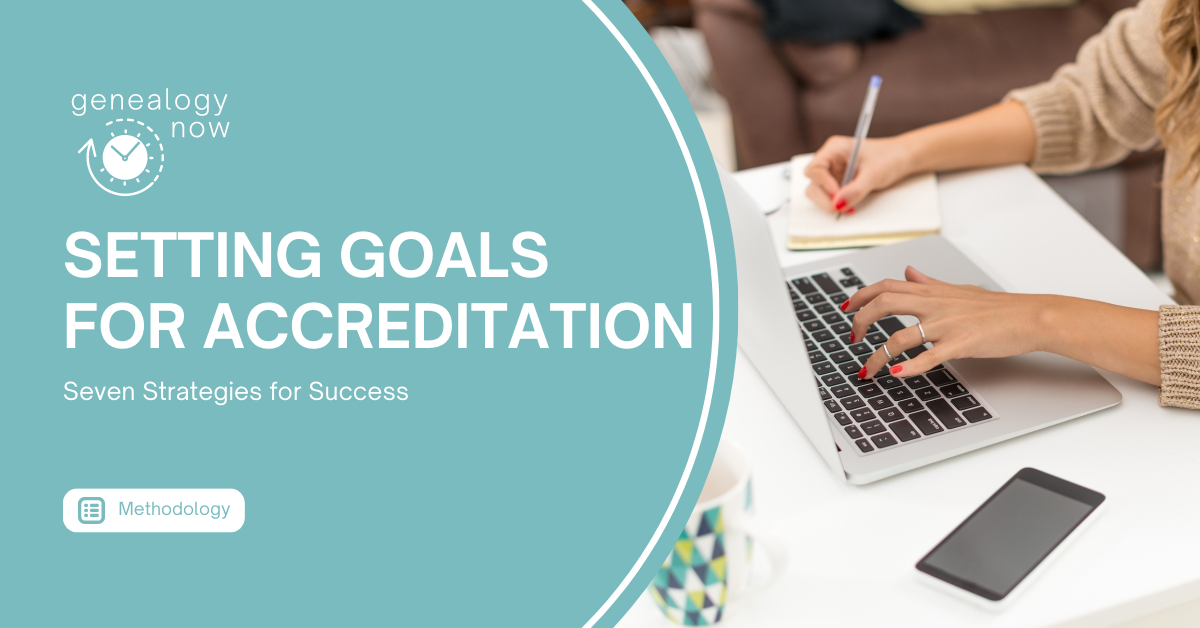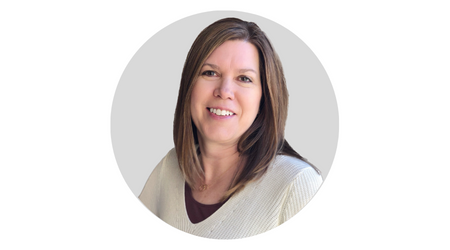
I completed the accreditation process and became an official Accredited Genealogist® professional in March. This came after many hours of research and preparation, but it was well worth the time spent, and I learned a few things about the process along the way. If you are considering accreditation, it can seem daunting. However, breaking the larger goal down into specific smaller goals will ensure your path to success. Here are seven strategies to consider:
1. Become familiar with the accreditation readiness assessment, which will guide your activities and preparation. Included are requirements for a certain number of hours of education and research, with specific guidelines for the number of hours that need to be spent in records for your region. You will need to have experience with relevant repositories and have experience writing research reports. The culminating activity will be the submission of your Level 1 Four-Generation Project.
2. Set a reasonable goal for when you would like to submit your Level 1 project. First, determine the number of research and education hours you will need to spend and how much research you still need to complete for your Level 1 Four-Generation Project. Next, divide the total number of hours needed by the number of hours you can commit to spending per week. This will tell you when you can reasonably expect to be ready to submit your Four-Generation project.
3. Begin tracking your hours. You will not need to submit a time log to ICAPGen. You will simply check the boxes on the Accreditation Readiness Assessment certifying that you have completed the required number of hours. Consider creating a spreadsheet with columns for each area you need hours for – records for each state, nationwide records, education activities, etc. Record the total number of hours you will spend in each area in the header of that column. Create a formula so that hours are automatically totaled at the bottom of each column. Use a tool like Toggl to track your time accurately.
4. Focus your research and education. Ensure that you are working on research projects that use the important record types for your region. Branch out beyond online repositories and begin requesting records from important offline sources in your work. If you don’t have ancestors who lived in parts of your region, consider asking friends and neighbors if they have ancestors from an area you need more work in, or simply access a probate or census record from a locality in your region and begin researching someone mentioned in that record. Seek out books, classes, and other educational opportunities that will help you learn more about researching in your region of specialization. Education that focuses on methodology is also essential.
5. Create a Research Reference Guide. Gathering resources for research in your area into one place has several benefits. First, as you create the guide, you will be solidifying your knowledge about your region of specialization. Next, you will be creating a library of articles and quick reference guides that will be of value to you during all future genealogical research. Finally, because the Level 2 & 3 exams are open book, your research reference guide will be something you can quickly consult during the timed tests.
6. Practice writing client reports. Even if you aren’t actively working as a professional, consider writing a formal report after every twenty hours of research. The more you can practice writing now, the better prepared you will feel when it is time to write your Four-Generation Report and take the Level 3 four-hour test.
7. Be sure to include enrollment in the ICAPGen Study groups in your plan. The time to apply for the Level 1 study group is when you have reached the following miles stones:
- You have chosen your accreditation region and have completed the required number of hours for researching in that region.
- You have completed most of your research for at least one generation of your Four-Generation Project.
- You have developed high-intermediate or advanced research skills.
- You have had experience writing research reports.
You can apply for the Level 2 & 3 Study Group after successfully completing the Level 1 Study Group and submitting your Level 1 Project. Or you can also apply for the Level 2 & 3 Study Group after successfully passing Level 1.
Taking these steps will ensure that you are well on your way to reaching your goal of becoming an Accredited Genealogist® professional. Best of luck to you as you begin or continue your journey!

Thank you so much for all the information in this post! I had been wondering how to organize what I would need to do for Level 1. You laid out the ideas so clearly that I know I can move forward more efficiently than I thought. Again, thank you! Susan
You’re welcome, Susan. Glad you found the information helpful.